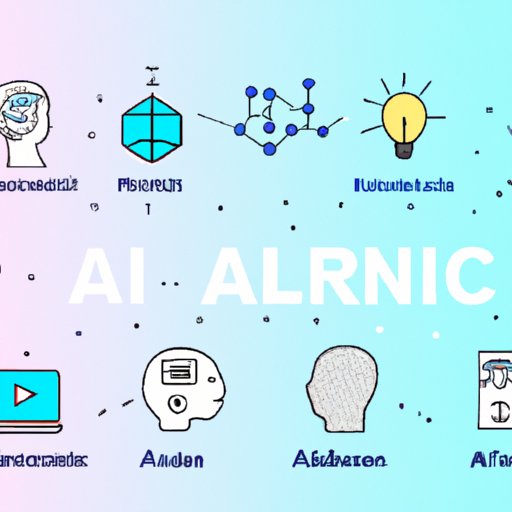Introduction
Artificial Intelligence (AI) and Machine Learning (ML) have been buzzwords in the tech industry for years, but what exactly are they? AI is defined as “the theory and development of computer systems able to perform tasks that normally require human intelligence, such as visual perception, speech recognition, decision-making, and translation between languages” (Oxford Languages). ML, on the other hand, is a subset of AI that enables computers to learn from data without being explicitly programmed. This article will explore the history, basics, applications, benefits, risks and future of AI and ML.
Exploring the History of AI and Machine Learning
The history of AI and ML dates back to 1950 when Alan Turing published his famous paper “Computing Machinery and Intelligence,” which introduced the Turing Test. This test proposed a standard for determining whether or not a computer has achieved true intelligence. The following decades saw major advancements in AI, including the development of expert systems and natural language processing. In the late 1980s and early 1990s, the focus shifted towards neural networks, which are modeled after the human brain and can be used for pattern recognition and prediction.
Introducing the Basics of AI & Machine Learning
AI and ML have become integral components of modern life. They are used for a wide range of tasks, such as image recognition, autonomous driving, and natural language processing. AI and ML are based on the idea of using data to make predictions and decisions. AI algorithms use input data to train an algorithm to recognize patterns, while ML algorithms enable machines to learn from data without being explicitly programmed.
Examining Applications of AI & Machine Learning
AI and ML are being used in a variety of fields, such as healthcare, automation, and customer service. In healthcare, AI and ML are being used to diagnose diseases, develop personalized treatments, and predict patient outcomes. In automation, AI and ML are being used to automate mundane tasks and optimize processes. In customer service, AI and ML are being used to provide automated support and enable more personalized interactions with customers.
Understanding the Benefits & Risks of AI & Machine Learning
AI and ML offer a number of benefits, such as increased efficiency, improved accuracy, and reduced costs. However, there are also risks associated with these technologies, such as privacy concerns, bias, and security vulnerabilities. It is important to weigh the pros and cons of implementing AI and ML carefully before making any decisions.
Investigating How AI & Machine Learning Impact Society
AI and ML have the potential to transform society in a number of ways. One of the most significant impacts is on employment. AI and ML can automate many tasks, which could lead to job displacement. Additionally, AI and ML can be used to improve economic efficiency, which could result in increased productivity and economic growth.
Analyzing the Future of AI & Machine Learning
Experts predict that AI and ML will continue to grow in importance in the coming years. According to a report by McKinsey Global Institute, “AI could add $13 trillion to global GDP by 2030.” This growth will require continued investment in research and development, as well as government oversight to ensure that these technologies are used responsibly. Additionally, there are a number of ethical and legal challenges that need to be addressed.
Conclusion
In conclusion, AI and ML are rapidly evolving technologies that have the potential to revolutionize many aspects of our lives. While they offer a number of benefits, there are also risks associated with them. It is important to consider the implications of these technologies carefully before implementing them. With continued investment and research, AI and ML could have a major impact on our economy and society in the years to come.
(Note: Is this article not meeting your expectations? Do you have knowledge or insights to share? Unlock new opportunities and expand your reach by joining our authors team. Click Registration to join us and share your expertise with our readers.)
